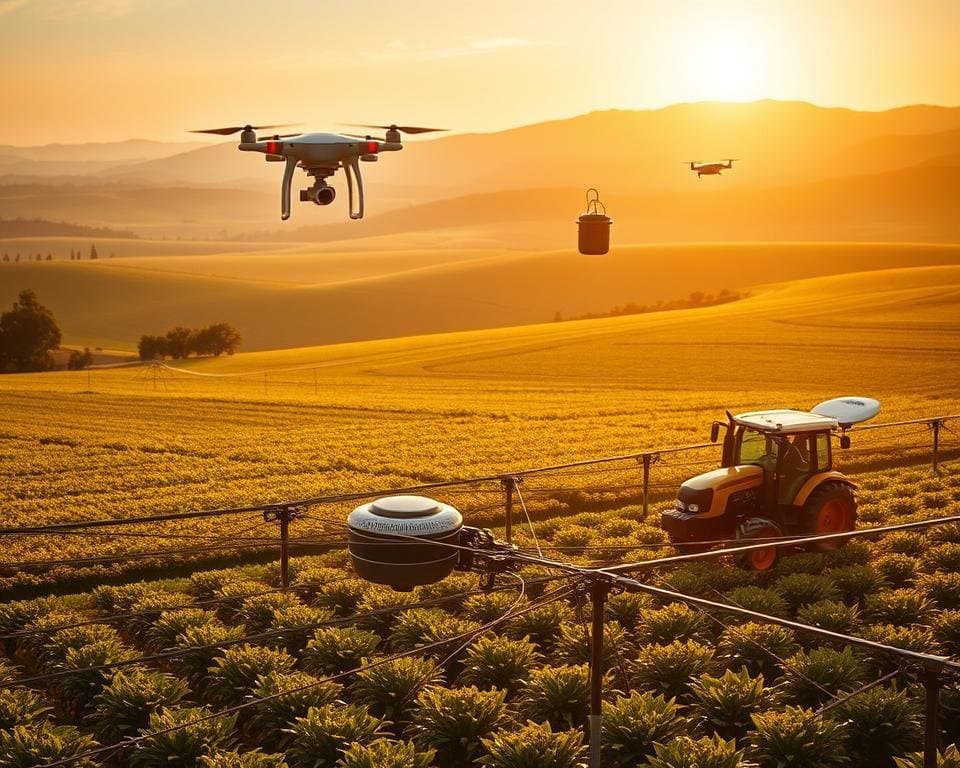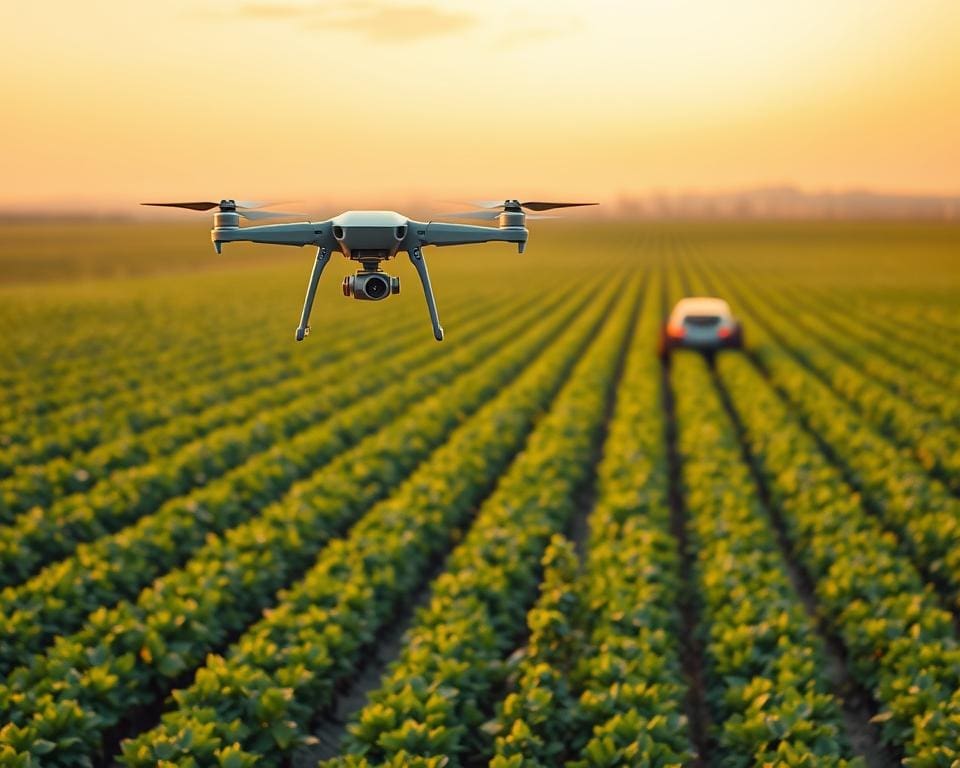The Internet of Things (IoT) is fundamentally reshaping the agriculture industry, ushering in a new era of smart farming solutions that promise to enhance productivity and sustainability. As UK farmers increasingly embrace these innovative technologies, they find themselves equipped with a wealth of data that informs decision-making and optimises resource management. This agricultural transformation is crucial for tackling pressing challenges such as climate change and food security.
Through the integration of IoT technologies, farmers can monitor crop health, livestock conditions, and environmental factors in real-time. This capability not only improves yields but also champions sustainability in UK agriculture, making it possible for the industry to thrive amidst escalating demands and environmental concerns.
The Role of the Internet of Things in Agriculture
The Internet of Things in agriculture marks a transformative shift in farming practices. This technology facilitates seamless communication between devices, creating a cohesive network that empowers farmers to monitor and manage their crops efficiently. By understanding how IoT technology integrates into various agricultural processes, stakeholders can harness its full potential to revolutionise traditional farming methods.
Understanding IoT Technology in Farming
At its core, IoT technology enables farmers to gather real-time data about their fields. This data includes crucial information on soil moisture levels, temperature variations, and crop health metrics. By leveraging these insights, farmers can make informed decisions that significantly impact their yield and resource management. The move towards data-driven agriculture underscores the relevance of the Internet of Things in agriculture.
Components of IoT Systems in Agriculture
Effective agricultural IoT systems rely on a combination of essential farming technology components. Key elements include:
- Sensors: These devices collect vital data, monitoring various environmental factors affecting crop growth.
- Actuators: They automate processes such as irrigation and fertilisation based on data received, improving resource efficiency.
- Data Analytics Platforms: These platforms analyse the collected data, facilitating the implementation of precision agriculture techniques.
Through the integration of these components, farmers can optimise resource utilisation and enhance farm management practices, leading to greater sustainability and productivity.

How is IoT reshaping the agriculture industry?
The integration of IoT applications in agriculture marks a significant shift in traditional farming practices. As crop management technology continues to evolve, farmers are leveraging these innovations to optimise resource use and enhance productivity. Smart farming applications provide the tools needed to tackle modern agricultural challenges efficiently and sustainably.
Innovative Applications in Crop Management
Smart irrigation systems form a core aspect of crop management technology. By utilising moisture sensors, these systems deliver targeted water supply tailored to the specific needs of each crop. This precision irrigation minimises waste while ensuring optimal growth conditions. In addition, aerial drones equipped with advanced sensors play a crucial role in monitoring crop health. These drones enable farmers to identify pests and diseases early, allowing for timely interventions that can save entire harvests.
Enhancing Livestock Monitoring and Care
In the realm of livestock monitoring, IoT devices are transforming animal health management. Wearable technology can track vital signs and movements of livestock, offering real-time data that assists farmers in maintaining herd welfare. This proactive approach not only improves the well-being of the animals but also enhances productivity by ensuring that any health issues are addressed promptly. With the rise of agriculture innovation, livestock care is becoming more effective than ever.
IoT Impact on Farming Efficiency
The integration of Internet of Things (IoT) technology is revolutionising farming efficiency through innovative practices. By utilising smart devices and sensors, farmers are reaping benefits that significantly enhance productivity. The IoT impact on farming extends into areas such as resource efficiency and waste reduction in agriculture. These advancements lead to a more sustainable future for farming.
Reducing Resource Waste
One of the most notable advantages of IoT solutions is their ability to minimise resource waste. Smart irrigation systems can monitor soil moisture levels and deliver water precisely when needed. This not only conserves water but also reduces operational costs for farmers. By analysing data in real time, farmers can better manage their resources, ensuring that every drop of water and every unit of fertiliser is optimally used.
Increasing Crop Yields Through Data Analysis
Addressing the challenge of boosting crop yields is where data analysis in farming proves invaluable. IoT-enabled devices collect vast amounts of data regarding environmental conditions, crop health, and growth patterns. Farmers can leverage this information to make informed decisions that promote higher productivity. By correlating data analytics with agricultural practices, they enhance their strategies to achieve better outcomes consistently. Ultimately, these methods lead to increased crop yields while supporting sustainable farming practices.
Smart Farming Technology: A New Frontier
Smart farming technology marks a significant evolution in agriculture, leveraging advanced innovations such as AI integration with IoT to revolutionise farming practices. These cutting-edge solutions empower farmers to monitor and manage their operations efficiently, harnessing real-time data to make informed decisions. Through the amalgamation of artificial intelligence and the Internet of Things, the agricultural landscape is undergoing substantial transformation.
Integrating AI with IoT for Better Outcome
The AI integration with IoT facilitates predictive analytics that enable farmers to anticipate challenges before they escalate. Implementing smart agricultural practices optimises resource usage, reduces waste, and ultimately leads to a more sustainable approach to farming. Such technology offers portable devices, sensors, and connected machinery that track vital parameters like soil moisture and crop health.
Case Studies of Smart Farms in the UK
Various agricultural innovation case studies highlight the successful implementation of smart farming technology within UK smart farms. For instance, certain farms have deployed AI-driven analytics to refine their crop cycle management. These practices have proven instrumental in boosting productivity while minimising operational costs. The learnings from these pioneering cases provide valuable insights into the future of farming, illustrating how technology can propel the industry towards greater sustainability and profitability.
Benefits of IoT for Farmers
The IoT benefits for farmers are substantial, influencing various facets of modern agricultural practices. With the rise of agriculture technology advantages, farmers can now connect their operations seamlessly across devices, leading to significant improvements in efficiency and productivity.
One of the primary aspects of these smart farming benefits lies in the economic benefits of IoT. By implementing IoT solutions, farmers experience reduced resource consumption, which directly translates into cost savings. Enhanced data analytics provide insights that help in decision-making, optimising crop yields and ultimately increasing profitability.
In addition to the economic advantages, IoT technologies foster sustainable farming practices. By minimising waste and optimising input usage like water and fertilizers, farmers contribute to environmental sustainability. These practices not only improve the health of the land but also ensure that farming remains viable for future generations.
As the adoption of IoT continues to rise, the overall landscape of agriculture is transforming. Farmers are empowered to make informed decisions, enhancing community engagement and promoting transparency in production processes. This shift highlights the critical role that IoT plays in cultivating a more efficient and sustainable agricultural sector across the UK.
Challenges and Considerations of IoT in Agriculture
The implementation of IoT in agriculture brings significant opportunities, yet it is not without its challenges. Farmers are faced with various hurdles that can impede the successful integration of these innovative technologies. Understanding these challenges is vital for navigating the evolving landscape of modern farming.
Data Security and Privacy Concerns
One of the most pressing IoT challenges in agriculture lies in data security in farming. As farmers increasingly rely on interconnected systems, the risk of data breaches and privacy violations escalates. Sensitive information regarding crop yields, livestock health, and farm operations could be exposed if adequate cybersecurity measures are not implemented. Farmers must prioritise robust security frameworks to safeguard their data against potential threats.
Cost of Implementation and Maintenance
Another barrier that many farmers encounter involves IoT implementation costs. The initial investment required for establishing IoT systems can discourage participation, particularly among smaller operations. Alongside initial expenses, ongoing maintenance of these technologies demands continuous financial commitment and technical expertise. Addressing these agriculture technology hurdles becomes essential for achieving widespread acceptance of IoT solutions in farming.
Future of IoT in Agriculture
The future of IoT in agriculture is set to transform the industry further, driven by innovative agricultural technology trends and the vital need for sustainability. With the rapid advancement of sensors and robotics, we can anticipate a shift towards more autonomous operations in farming. These emerging IoT innovations will enable farmers to streamline processes while enhancing productivity and reducing manual labour.
Trends to Watch
One key trend influencing the future of IoT in agriculture is the increasing adoption of integrated data systems, which allow for better decision-making. By leveraging big data analytics, farmers can optimise crop management and anticipate challenges, ultimately leading to a sustainable farming future. These powerful technologies will play a critical role in agricultural practices, fostering a culture of continual improvement and environmental stewardship.
Sustainable Growth Prospects
As the agricultural sector faces mounting pressures from climate change and resource scarcity, IoT solutions will be critical in promoting responsible resource management. The emphasis on sustainability has opened doors for innovative applications that not only improve efficiency but also protect our planet. Continuous investment and research in these technologies are essential to harness their full potential and ensure a thriving agricultural landscape for generations to come.









